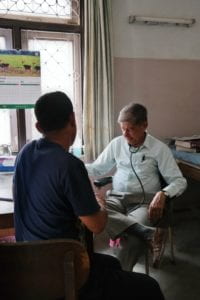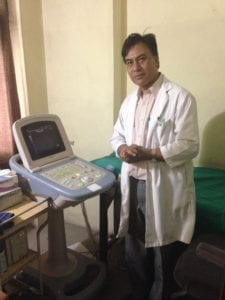Mehreen Arif
FSB Nepal and HealthRight International
Kathmandu, Nepal
Hello everyone, I come bearing glad tidings. I have received Nepalese Health Research Council (NHRC) approval for my project. However, I am also in dire straits, because I am still waiting on American (IRB) approval, and that will take some more time. But I keep telling myself that everything will hopefully fall into place soon enough and that patience is pivotal for me.
The good thing is that however frustrated I get about approval proceedings, my patience is far from wearing out because the approval proceedings has offered me a unique opportunity to get to know the people of The Friends of Shanta Bhawan (FSB) clinic.

I have been shadowing Dr. Laxmi Luitel (one of the three physicians at FSB). Dr. Laxmi grew up in a rural part of Nepal and moved to Kathmandu to become a Health Assistant (paramedic). Soon she got married and had a baby boy, but decided she wanted to do more. And hence started her pursuit of becoming a doctor. With the support of her family who took care of her baby in Nepal, she set off with her husband to China where they both pursued medicine for 4.5 years. Dr. Laxmi is a primary care physician but hopes to one day specialize in gynecology because of the dearth and demand of female doctors in the country and her passion for helping women.
Empowering the girl child in South Asia and Africa is a big feat and one that is often accomplished by social workers or NGOs but seldom thought of as a doctor’s or public health professional’s job. But I have realized that is very much a doctor’s and a public health professional’s job.

A few days ago I had the unique opportunity of meeting three amazing first year medical students from UC Davis who were on an observational placement also shadowing doctors and nurses at FSB. These three individuals became my friends in only a few hours and we hung out for the three days they were at FSB, then had a farewell dinner (for them) together on Saturday.
Much like Dr. Laxmi, Alejandra, David and Margie taught me the meaning of service and commitment to bettering peoples’ lives as they shadowed at FSB, served and raised awareness at health camps in villages, and taught local school children about medicine and health.
Going back to Dr. Laxmi again: she owns a hospital in the ancient Newar town of Sankhu (outside of Kathmandu) with her husband, but she is committed to her service at FSB clinic as well, so she works here from 9 am to 3 pm everyday (besides Saturdays) and then works at her hospital from 4-5 pm till nighttime.
My shadowing experience with Dr. Laxmi was extraordinary.

Not only did I get to observe physical exams, pelvic exams (pap smears), patients with diabetes, uric acid, hypertension, piles, UTIs, gastro-intestinal issues, chest infections, pneumonia, pulmonary tuberculosis, jaundice, thyroid problems, constipation, pregnancy issues, vitamin deficiency and infertility; but I also got to see the smile, heartening responsiveness and sheer concern with which Dr. Laxmi treats her patients. This is something that I have read a lot about in my public health curricula at university but had never really experienced first hand: the importance of empathy, bedside manner and trauma informed care principles in medical practice.
It should also be noted that due to the dust, pollution and unhygienic conditions of the Jorpati and Boudha area many patients come in with pulmonary tuberculosis, gastrointestinal diseases and UTIs. And during the physician visits Dr. Laxmi not only told her patients about their diagnosis but what stood out to me was that she would make an extra effort to educate her female patients about hygiene and sickness. She drew diagrams to explain the position of the urethra, vagina and anus and how clean wiping and safe sex measures should be implemented in order to avoid UTIs and pelvic inflammatory diseases.
As I shadowed Dr. Laxmi we saw all types of patients from infants, to children, to adults (including Nepalese ethnic minorities and Tibetan refugees).

I also recognized that the Nepalese ethnic minorities or Tibetans usually came in with a family member who had a better command of the Nepali language because the Nepalese ethnic minorities were comfortable speaking their regional/tribal languages and the Tibetans were comfortable speaking Tibetan. Language plays a huge part in access—access not just to healthcare or education but to a sense of identity and belonging.
Furthermore, I observed that the doctors (Dr. Laxmi, Dr. Shyam and Dr. Bhumi Upreti) at FSB see on average 45 to 48 patients a day and on busier days – almost 80 to 88 patients per day.

What was more noteworthy was that after a physician visit if a patient was prescribed to get X-rays, EKGs, ultrasounds, abdominal scans or blood drawn for testing – they can do so at the clinic there and then and wait on their reports and refer back to the physician again – all within the span of one visit. Additionally, the set fees for physician visits are NPR 50 for previous patients (US $0.49 = 49 cents) and NPR 60 for new patients (US $0.58 = 58 cents). Ultrasounds, scans and X-rays all range from NPR 250 to NPR 600 (US $2.50 to $6.00).

One of the physicians Dr. Sam (Dr. Shyam Shrestha) also serves as the ultrasonologist, thereby curbing additional expenses for the clinic so that the clinic continues to provide subsidized care for its patients while also providing free tuberculosis medication.
The clinic also offers free lunch everyday at 11:30 am sharp for all of its staff prepared by Mona ji, Mina ji, and Babita ji. They are extremely hardworking and contribute to the well oiled (food) and structure of FSB.



At FSB I have enjoyed copious amounts of chawaal (rice), daal (lentils), masala, vegetables, fried potatoes, tea, and the list continues; all thanks to the ladies who work in the kitchen and feed about 27 people daily and now graciously feed me as the 28th person.

At the end of the day they leave the kitchen spick and span with pans, plates and utensils neatly stacked.
Moreover, I sit next to Ms. Ishwori Shah the Finance and Admin Chief of the clinic and adjacent to Ms. Sarita Basnyat the Finance and store assistant (who has worked at FSB since 1992). Both women handle the finances, revenue and external communication with donors/suppliers of FSB clinic. Ms. Ishwori continues to help and support me during my time at FSB clinic.






These people (along with many others who are not mentioned in this post) constitute the staff of the Friends of Shanta Bhawan clinic under the guidance of Sir Sanjaya Basnyat (the Chief Executive Director of FSB). Sir Basnyat is very inviting towards volunteers, international physicians, NGOs, researchers, and donors who could contribute to the enrichment and prosperity of the clinic. He has also helped me tremendously in preparing for my project in Nepal.
In addition, Sir Basnyat is a strong advocate for the health and wellness of the people of Jorpati and Boudha and the importance this clinic holds for the community. For example, in the year 2016 FSB succeeded in providing care to 19,326 previous patients, 12,040 new patients, and 11,296 patients under 5 years old. In the previous year FSB administered roughly 4,414 ultrasounds and X-rays, 65 ECGs and 15,455 pathology (blood, urine, stool, HIV, immunology and vaginal smear) analysis reports. A comprehensive patient census is collected each month and divided by old/new patients, patients under 5, pathology reports, patients for each doctor and even a patient census by caste (Janajati, Dalit, Muslim, Brahmin and Chhetri, Madheshi, and Tibetan refugees). Furthermore, FSB is facing a lot of hurdles with the government’s plan on demolishing the buildings on either side of the Boudha road (including FSB clinic) in order to expand the road.
Due to the subsidized nature of FSB’s clinical services the clinic urgently requires funding and donations after incurring a heavy yearly loss (with an average deficit of NPR 1,00,000/ US $1,000 a month).
Despite all the hardships, Sir Basnyat and the FSB team have a future plan for FSB that includes first and foremost its relocation (which comes with caveats such as losing their present patient influx and generating additional revenue for relocation), providing extensive pediatric and gynecology services, developing a birthing center, establishing an automated registration system, and procuring advanced medical equipment for the clinic.
And hopefully, my research with Tibetan refugees will help FSB in providing counseling and mental health services for Tibetan refugees and expanding services to include Nepalese ethnic minorities as well.
In conclusion, the FSB clinic has benevolently opened their arms and accepted me into their friendly family. I hope to return their heartwarming hospitality through my research and raising awareness not only about Tibetan refugees but about the Friends of Shanta Bhawan clinic alongside HealthRight International and the vital work and much needed care they provide to people in the region.